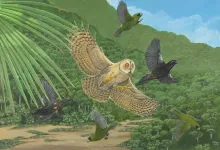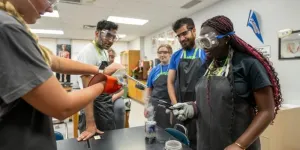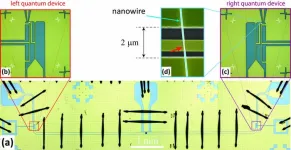(Press-News.org) The extinction of hundreds of bird species caused by humans over the last 130,000 years has has led to substantial reductions in avian functional diversity – a measure of the range of different roles and functions that birds undertake within the environment –
and resulted in the loss of approximately 3 billion years of unique evolutionary history, according to a new study published today in Science.
Whilst humans have been driving a global erosion of species richness for millennia, the consequences of past extinctions for other dimensions of biodiversity are poorly known. New research lead by the University of Birmingham highlights the severe consequences of the ongoing biodiversity crisis and the urgent need to identify the ecological functions being lost through extinction.
From the well-documented Dodo to the recent Kauaʻi ʻōʻō songbird declared extinct in 2023, scientists currently have evidence of at least 600 bird species having become extinct as a result of humans since the Late Pleistocene when modern humans started to spread throughout the world. Using the most comprehensive dataset to date of all known bird extinctions during the Late Pleistocene and Holocene, the paper ‘The global loss of avian functional and phylogenetic diversity from anthropogenic extinctions’ looks beyond the number of extinctions to the wider implications on the planet.
Lead author Dr Tom Matthews from the University of Birmingham explained: “The sheer number of bird species that have become extinct is of course a big part of the extinction crisis but what we also need to focus on is that every species has a job or function within the environment and therefore plays a really important role in its ecosystem. Some birds control pests by eating insects, scavenger birds recycle dead matter, others eat fruit and disperse the seeds enabling more plants and trees to grow, and some, like hummingbirds, are very important pollinators. When those species die out, the important role that they play (the functional diversity) dies with them.
“In addition to functional diversity each species also carries a certain amount of evolutionary history, therefore when that species becomes extinct, it’s basically like chopping off a branch of the tree of life and all of that associated phylogenetic diversity is also lost.”
The research found that the scale of anthropologenic bird extinctions to date has resulted in a loss of approximately 3 billion years of unique evolutionary history, and 7% of global avian functional diversity – a significantly larger amount than expected based on the number of extinctions. Given the wide range of important ecological roles performed by birds, the loss of avian functional diversity in particular will likely have had far-reaching implications. These post-extinction aftershocks include reduced flower pollination, reduced seed dispersal, the breakdown of top-down control of insect populations - including many pests and disease vectors - as well as increased disease outbreaks due to reduced consumption of carrion. In addition, the downsizing of the global avifauna documented in the research will likely affect the ability of many plant species to track present and future climate change.
Dr Matthews concludes: “These results are a timely reminder that the current extinction crisis is not just about species numbers. By identifying declines in avian functional and phylogenetic diversity driven by human actions, our findings highlight the urgent need to understand and predict the impacts of past anthropogenic extinctions on ecosystem function in order to prepare for the magnitude of expected future loss from the projected 1,000 bird species that are expected to die out completely over the next two centuries. This information is vital for setting effective targets for global conservation strategies, as well as ecosystem restoration and rewilding efforts.”
END
The true global impact of species-loss caused by humans is far greater than expected – new study reveals
2024-10-03
ELSE PRESS RELEASES FROM THIS DATE:
Smartphone-assisted “scavenger hunt” identifies people at risk for dementia
2024-10-03
Researchers from DZNE and Otto von Guericke University Magdeburg have identified individuals with increased risk for dementia using mobility data, recorded during a smartphone-based wayfinding task on the university campus. The findings, reported in the journal PLOS Digital Health, show the potential of smartphone data, collected in conditions close to everyday life, for the early detection and monitoring of Alzheimer’s disease. The study included 72 adults; about a third of them with subjective cognitive decline (SCD), a condition that is a known risk factor for dementia.
Alzheimer’s disease usually develops unnoticed over years and eventually ...
Green subsidies may have hidden costs, experts warn
2024-10-03
Government subsidies for business practices and processes should be approached with caution, even when they seem to be environmentally friendly, writes a group of scientists and economists in this week’s Policy Forum in the journal Science.
They argue that subsidies can alter market pressures, leading to unintended consequences that not only perpetuate harmful subsidies over time but also diminish the overall effectiveness of those intended to promote environmental sustainability.
Therefore, when they must be used, subsidies should have clear end-dates, advise the authors.
“We’ve got this odd juxtaposition of ...
Small brains can accomplish big things, according to new theoretical research
2024-10-03
Neuroscientists had a problem.
For decades, researchers had a theory about how an animal’s brain keeps track of where it is relative to its surroundings without outside cues – like how we know where we are, even with our eyes closed.
According to the theory, which was based on brain recordings from rodents, networks of neurons called ring attractor networks maintain an internal compass that keeps track of where you are in the world. An accurate internal compass was thought to require a large network with many neurons, while a small network with few neurons would cause the compass’s needle to drift, creating errors.
Then researchers discovered an internal compass ...
UTA professor honored for science education leadership
2024-10-03
University of Texas at Arlington UTeach Master Teacher Karen Jo Matsler will be awarded the 2025 Melba Newell Phillips Medal in January from the American Association of Physics Teachers (AAPT) in recognition of her extensive contributions to physics education and her tireless efforts to support educators nationwide. Founded in 1930, AAPT is a national organization dedicated to advancing the teaching and understanding of physics.
For more than 20 years, Dr. Matsler has been a tireless advocate of physics education, working with state legislators and educational agencies ...
Decline of mpox antibody responses after modified vaccinia Ankara–Bavarian Nordic vaccination
2024-10-03
About The Study: The modified vaccinia Ankara–Bavarian Nordic (MVA-BN) vaccination generated mpox antibodies that waned by 6 to 12 months. In participants who received 2 doses of MVA-BN vaccine, mpox antibody responses at 12 months were comparable to or lower than peak antibody responses in people receiving 1 dose, which provided limited protection.
Quote from corresponding author Dan H. Barouch, MD, PhD:
“In this observational study, we show that mpox antibody responses decline 6-12 months following Jynneos (MVA-BN) vaccination. Our data suggest that protective immunity may ...
Wider use of convalescent plasma might have saved thousands more lives during pandemic
2024-10-03
A new study led by researchers at Johns Hopkins Bloomberg School of Public Health estimates that thousands of lives could have been saved during the first year of the COVID-19 pandemic if convalescent plasma had been used more broadly, particularly in outpatients at high risk for severe disease and in hospitalized patients during their first few days of admission.
Convalescent plasma from patients who had recovered from COVID was used starting in the early months of the pandemic at the urging of a group of physicians who cited the blood ...
Strong coupling between Andreev qubits mediated by a microwave resonator
2024-10-03
Quantum communication and quantum computing operate based on quantum bits (qubits) as the smallest unit of information — related to bits in a classical computer. Of the many different approaches currently being investigated around the world, one promising option is to use Andreev pair qubits.
These qubits are formed at interfaces between a metal and a superconductor in a process known as Andreev reflection. Here, an electron from the metal enters the superconductor, where it becomes part of an electron pair (a Cooper pair) — while a hole, ...
UNF biological sciences professor receives NIH grant to study muscle atrophy
2024-10-03
Jacksonville, Fla. – A University of North Florida biology professor has been awarded a prestigious four-year National Institutes of Health (NIH) grant totaling over $720K to study the functional role of an enzyme called dual-specificity phosphatase 4 (Dusp4) in skeletal muscle atrophy.
Dr. David Waddell’s NIH-funded research project will help contribute to knowledge about skeletal muscle atrophy associated with neuromuscular disorders, neurodegenerative diseases and aging. Skeletal muscle atrophy is a decrease in muscle mass that occurs when protein degradation exceeds protein ...
Child Health Day 2024: influenza vaccine protects children from infection and hospitalization for the disease, Spanish study shows
2024-10-03
A study published on Eurosurveillance has demonstrated that Spain's influenza vaccination campaign for children aged 6-59 months during the 2023/24 season was effective in preventing acute respiratory infections (ARI) and hospitalisation, as vaccination was recommended for this age group at the national level for the first time.
In the context of Child Health Day 2024, this research emphasises that continued efforts should be made to increase vaccination coverage among children for future seasons.
Context and methods
Influenza A was dominant in the 2023/2024 season, ...
Announcing the 2024 Glenn Foundation Discovery Awards: Jeffrey Friedman, MD, Ph.D/ (the Rockefeller University) and Myriam Heiman, Ph.D. (MIT)
2024-10-03
Santa Barbara, CA and New York, NY -- The Glenn Foundation for Medical Research (GFMR) and the American Federation for Aging Research (AFAR) are pleased to announce the 2024 recipients of the Glenn Foundation Discovery Awards: Jeffrey Friedman, MD, PhD (Professor, The Rockefeller University and Investigator, Howard Hughes Medical Institute) and Myriam Heiman, PhD (Associate Professor of Neuroscience, Massachusetts Institute of Technology).
The Glenn Foundation Discovery Award supports research projects with strong potential to develop pioneering discoveries to understand ...


